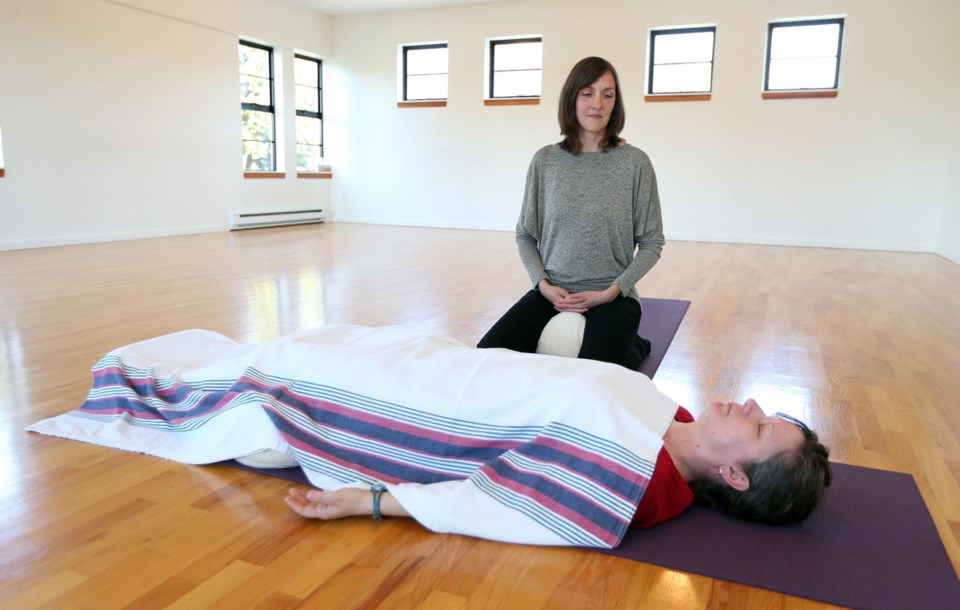Oak Bay mom Stephanie Novak was convinced long ago — during struggles with post-partum anxiety — about the emotional effectiveness of meditation and mindfulness.
The ongoing practice of mindfulness has kept Novak aware and ready to join in those other weirdly wonderful moments of motherhood. It’s true even when her son, 5, or daughter, 10, seem determined to drive her nuts.
By practising mindfulness, “I find it’s easier in those moments to not get swept away in the impatience, the frustration or the judgment,” said Novak, 45.
“So I can look at what’s happening with my kids and realize, ‘Wow, they are actually pretty funny.’ ”
“‘Sure, they are pushing my buttons but they have a great sense of humour,’” said Novak.
“If I can be calm and start to see it from a perspective like that they don’t seem to respond by pushing or testing me.”
Mindfulness, put simply, is a type of meditation in which the practitioner learns to concentrate on living in the moment. With special mental checklists, routines and practices, a person strives to be aware of what’s happening around them. At the same time, they learn to recognize how their bodies and minds are reacting.
Once, often dismissed as New-Age silliness, it has now reached the point where some of the best medical schools and prestigious universities in North America teach it, such as Brown University in Rhode Island, Dalhousie in Halifax, Duke University in North Carolina, Georgetown in Washington D.C., McGill in Montreal, and the University of Toronto.
Now in Victoria, women such as Novak are enrolling in a mindfulness program reserved just for mothers called Mindful Mamas, now in its second year at the Elements of Health Centre.
Stephanie Curran, a mother of a 21/2-year-old daughter and a longtime practitioner and teacher of mindfulness and meditation at Elements of Health, said mothers are great subjects for mindfulness.
Curran said it helps us give our children one of the most important things we can ever offer: ourselves, fully committed to a child’s moment.
“We can try to give our kids so much, shuttling them here and there,” said Curran.
“But, really, the most precious gift we can give our kids is the gift of our full presence, of really being there with them, in the moment, whatever that moment is.”
And with no past to obsess over and little concept of a future to worry about, children, especially little ones, are huge creatures of the moment, completely invested in the here and now, she said.
“They can be such little beings of presence,” she said. “They can hardly walk down the street for stopping to look at all the dandelions.”
So “mindfulness is not just for the challenging times when the stress levels are high,” said Curran. “There are also these precious moments that are so lovely and joyful to be present for.”
Mindful Mamas is an hour-long session that starts with 10 minutes of instructed relaxation: learning to relax, breathing and concentrating on various body parts and feelings. This is followed by a session of meditation. And it ends with a reading or the playing of an aural recording followed by a discussion and sharing of recent experiences.
The exercise, said Curran, is not about reaching some point of strict, mental discipline where no outside thought intrudes. Instead, the point is to become aware of your mind’s wanderings and your body’s reactions as each thought or remembrance is encountered.
She said by learning to recognize what is happening in mind and body, a mindfulness practitioner can develop a “muscle” of awareness. And with that muscle, we can learn to respond to stress instead of just reacting to it.
Responding versus reaction “is a subtle difference in the language and how that can look can be quite significant,” said Curran.
She said mindfulness will never make stress disappear. “We are all going to have stress,” she said. “Stress happens.
“But if it’s carrying on at a high level for a long period of time, we might not have that quality of patience and we don’t have that quality of being self regulated.
It becomes easier to just react in a knee-jerk sort of way instead of as being able to pause and look at the situation.”
Elements of Health Centre is also getting set to run a new mindfulness program, this one for mothers and their infant children six months or younger. Called Listening Mothers, it’s an attempt to bring mindfulness to those early months of motherhood.
Unlike Mindful Mamas, however, Listening Mothers sessions are not expected to be quiet. The presence of infants makes that impossible.
But Curran said the idea is to take a mindfulness approach to that “moment-to-moment interaction you are having with your baby.
“What are the baby’s emotional developments and what are their needs and how do you deal with different temperament and what are the changes in your life and in your relationships?
“Mindfulness-based skills can help to reduce the stress of the newness of having this new being you are tending and encourage balance and well-being.”
Meanwhile, a significant, omission from the mindfulness sessions at Elements of Health are sessions for men.
“We are hearing our mothers say things like, ‘My partner would really love to come to something like this, do you think you could offer something for men?’” said Curran.
“So it’s something that is being considered for the future,” she said.
To learn about Mindful Mamas and Listening Mothers, visit elementscentre.ca.
